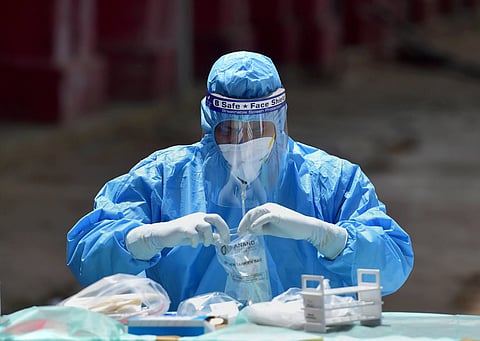COVID-19: 63 JN.1 cases detected in India but not leading to hospitalisations, say officials
NEW DELHI: Sixty-three cases of COVID-19 sub-variant JN.1 were reported in the country, including 34 in Goa. However, top officials said the new strain is not leading to severity or hospitalisations.
Speaking to The New Indian Express, Dr N K Arora, India SARS-CoV-2 Genomics Consortium (INSACOG) head, said, “We are monitoring the situation and will be able to tell, in three to four weeks, how the new subvariant is behaving clinically in India.”
He added, “We must wait and see how this new virus expands in India. It is good to be vigilant, but we should not panic.”
He also said that “one comforting thing is that the virus is mild and it is not leading to hospitalisations.”
According to officials, till Sunday, 63 cases of JN.1, which is leading a surge in COVID-19 cases in the US, China and Singapore, were reported in India, of which the maximum was from Goa.
It is followed by Maharashtra (9), Karnataka (8), Kerala (6), Tamil Nadu (4) and Telangana (2).
Arora said that one reason JN.1, declared by the World Health Organisation (WHO) as a "variant of interest," is being reported more from Goa could be because the state has seen an increase in domestic and international tourists in the past few weeks because of New Year festivities.
He accepted that there was a dip in COVID testing in the country - an issue that was first flagged by this paper.
“In the recent meeting by the Union Health Minister, all the state and union territories were asked to ramp up testing as it has dipped. Covid-19 cases are indeed increasing in India, but we have to see how the virus behaves in the coming three to four weeks as testing ramps up,” he said.
Stressing that each new virus behaves differently in each country, he said they must see how the new strain impacts India.
While Omicron's BA.4 and BA.5 wreaked havoc globally, in India, it did not have that much impact, he said.
Arora said apart from the Delta variant, no other variants have caused that much damage and deaths in India. “Omicron has 55 subvariants. But it did not threaten India as seriously as Delta did.”
He, however, said that those above 60 years and high-risk people who are co-morbid should be careful and follow precautions.
“They have to be very careful. If they have a common cold, then they should get tested. If they face any health concerns, they should immediately seek medical advice,” he said.
On the vaccine, Arora said only those who are co-morbid and have not taken precautionary or the third dose should take it; all else don’t require it.

